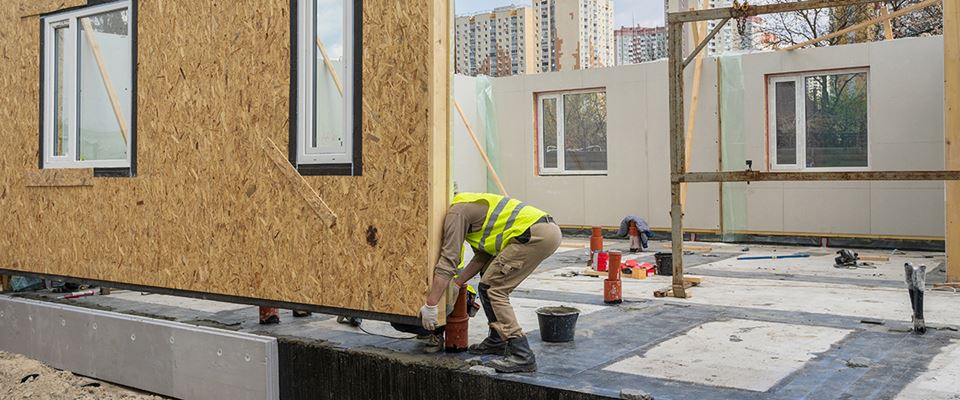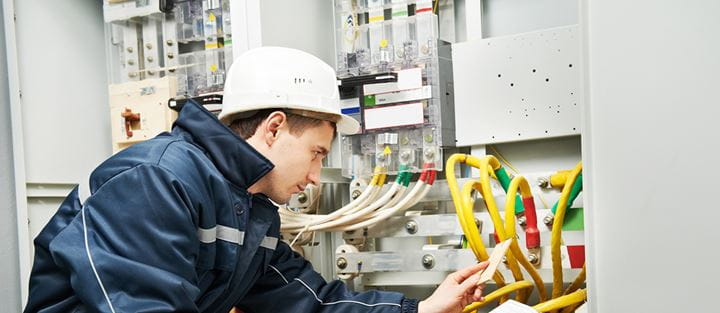The COVID-19 crisis has accelerated a radical shift in the way construction is done, as firms adopt some major transformational trends that are set to drive innovative and more productive ways of working. But what are these and how can organisations in the UK construction sector sustain the potential opportunities?
The rise of modular construction
Modular construction is seeing a steady rise in the UK, thanks to advancements in Artificial Intelligence (AI) – like Building Information Modelling (BIM) - and improved offsite manufacturing capabilities. Offering developers the benefit of high levels of quality assurance and fast construction speeds, the ability to deliver mass customised buildings and repeatable elements is driving a wider use of these methods and technologies.1
Sustainability
Alongside carbon reduction, firms need to consider the environmental impact of supplies and materials. Similarly, when working on-site, water consumption, dust, noise, and waste will become increasingly critical factors.
Last year the UK (UKGBC) Green Building Council launched its Climate Commitment Platform, which represents the building industry’s response to climate change and carbon reduction targets.2
What are the main environmental risks that construction firms need to consider as part of their risk management and insurance arrangements? Read our latest article to find out.
As well as stimulating raised awareness of the urgent need for change among designers, developers, contractors and investors, there’s evidence that support for enhanced sustainability is already translating into public policy. In 2019, the Welsh government announced over £30 million for innovative housing in Wales – part of a £90 million fund to test new approaches to developing sustainable social and affordable housing.3
Delivering digital
This could be implementing the advanced connectivity platforms that make it easy to engage in collaborative contracting and digital project scheduling. As this could enable firms to deliver projects faster, to a higher quality, and at a lower cost.
Or perhaps harnessing innovations like Building Information Modelling (BIM) or exciting new developments in smart and sustainable building materials. All of which make it possible to simplify engineering processes, minimise construction errors and delays, and enable a new era of highly sustainable buildings that require minimal external energy input.
Greater specialisation
The move to a more ‘industrialised model’ will see firms increasingly focused in target niches and segments (luxury single-family housing, multi-storey residential buildings, hospitals, schools) where they can build true competitive advantage. As a result, they will specialise in using different materials or methods of construction and will work in partnership with other collaborative contractors and specialists. For some, the focus for revenue generation will shift from the initial project to capturing long-tail additional opportunities like maintenance and facilities management.4
Sustaining the opportunities
Capitalising on these transformational trends, as well as the shorter term opportunities in the sector, could depend on taking steps to lay the foundations for growth. Consider:
People
Training the workforce in appropriate environment and sustainability practices and communicating the future overall strategy of the business will enable firms to execute their business strategy effectively – and minimise the risk of potential compliance breaches.
Similarly, providing senior management with the skills they’ll need to focus on health and safety issues will be mission critical. Alongside creating targets for accident-free workplaces, supported by a zero-tolerance approach to unsafe practices, firms will need to assure subcontractors comply with a relevant safety scheme in procurement (SSIP). And finally, employee health and benefits packages may also need to be re-visited as part of a future-proofed people strategy. Failure to attract high-quality employees could affect the ability to win or perform contracts, grow a business, and meet objectives. High staff turnover could also undermine market confidence. Moreover, a non-inclusive environment could result in cases of discrimination and harassment, resulting in reduced employee engagement and productivity, and reputational damage.
Data governance and cyber security
Construction’s growing reliance on digital technologies means that hazards like cybercrime and GDPR non-compliance now represent a growing risk. Strengthening endpoint protection and data back-up procedures is just the start. Alongside ensuring they can withstand a cyber-attack, prevent service failures, and recover systems promptly, staff will need training on data protection, cyber security and the importance of preserving the data of suppliers, customers and employees.
Preserving financial security
A lack of financial robustness could result in defaults, an inability to compete for long-term contracts, or to win work. In these difficult times, managing liquidity and financial liabilities will be vitally important. It will be critical, for example, to accurately profile new opportunities to ensure they meet profit expectations. Similarly, monitoring key areas like overdue work in progress, debtors or retentions will help keep trading results and balance sheets in good order.
Mitigating construction risk
No one can predict the future. But taking a strategic approach to risk management can help mitigate damage to relationships with clients and supply chains – and minimise potential financial losses.
This article is taken from chapters three and four in our new insights guide for the UK construction sector. Get your free UK Construction insights guide to access the full insights. If you wish to discuss any of the talking points in this article, please get in touch with one of our construction insurance experts.
Sources
1 pbctoday.co.uk/permanent-modular-construction
3 gov.wales/new-projects-inspire-social-housing-future-announced











